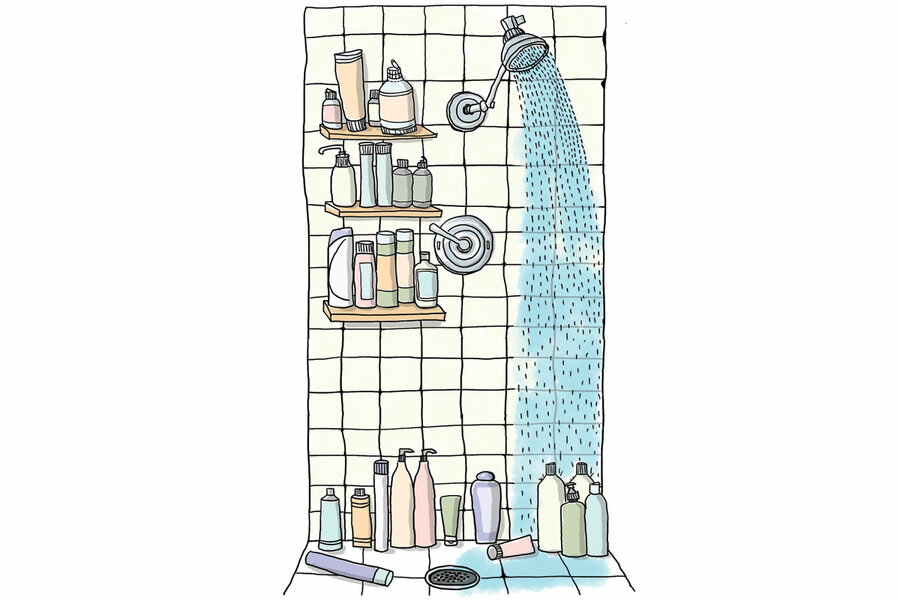Awash in a sea of shampoo
Loading...
The excitement in the air is palpable in my house, as I’m about to finish off a 28-ounce bottle of shampoo. I didn’t buy it. It just appeared one day. Twenty-eight ounces is a lot of shampoo, especially if you believe that it’s necessary to lather and rinse only once and that repeating is for suckers.
This big black bottle of unwanted salon-grade shampoo found a home in my shower the same way three cats and two dogs found their way to our various couches, beds, and favorite chairs: They were all given a home by my wife.
To be fair, I buy and subsequently reject an awful lot of deodorant. I understand that what seems acceptable in the personal-care aisle of the grocery store may fail to please at home. For instance, I won’t use a stick deodorant that smells good but feels like a block of cheddar cheese being dragged over my armpit, or a roll-on that claims a full 72 hours of protection but dries like spar varnish.
I have fulfilled this role, the consumer of rejected shampoo, for my entire married life. It’s meant that I’ve had much better shampoo than I ever would have bought for myself. (Did you know that, if your standards are low enough, you can buy a full-size bottle of shampoo for about a dollar? Sure, it may burn a little and smell like brake fluid, but it’ll do the job.) This French shampoo makes my hair shiny and full – no less gray or unevenly cut, mind you, but certainly shinier and fuller than I deserve. And no wonder: The bottle assures me, and I quote, that this shampoo contains seven times the luxurious moisture. Seven times! I’m not sure compared to what, or how they manage to multiply the moisture in a product that’s already liquid. But hey, I’m not a shampoo scientist, and so I take their word for it.
When I run out of this shampoo, sometime in the next few weeks, I’ll have a replacement bottle of equally miraculous shampoo waiting on deck. In fact, I’ll have quite a few of them.
I had a friend in New York who had a wife and two daughters. His wife and daughters had all become quite particular about shampoo, and his story is one that I keep trying to forget.
One day after a casual lunch in their apartment, he pulled me aside in the kitchen. He looked around to be sure we were alone. “I want to show you something,” he whispered. I followed him to a closed door near the back stairwell. There was something desperately confessional in his tone, and I was suddenly a bit uncomfortable.
He opened the door to a tiny bathroom – his bathroom – and turned on the light and said, “Look.”
Afraid I was about to see a body wedged against the sink, I stepped in. I looked around, turned off the light, backed out quickly, and closed the door.
“Wow,” I said.
My friend nodded. “Yeah. Wow.” He was a little wild-eyed. “I don’t know what I’m going to do,” he said quietly. I shook my head. “They just keep coming. Last week, there were 11, I got home Friday, and there were 17.” Seventeen bottles of shampoo, that is.
Every flat surface, including the floor of the shower, seemed to be covered with bottles of shampoo.
“Throw some out?” I said.
He looked at me beseechingly. “But there’s nothing wrong with them!” he said.
My friend was the CEO of a Fortune 500 corporation and lived what I imagined was a fast-paced life filled with serious meetings in oak-
paneled conference rooms, making big decisions that shaped and shifted the global economy. He seemed to take those decisions in stride, but I could see he was overwhelmed by the rising tide of loser shampoo.
I tried again: “Give them away?”
His eyebrows raised in disbelief. “To who? Do you want our used shampoo?”
I shook my head and said, perhaps too quickly, “I’ve got my own shampoo problems.”
“Right,” he said, and sighed. “I’m sorry. I just had to tell somebody.”
In the years that followed, we never spoke of this again. His daughters grew up and left home, which must have lowered the stakes a bit. I like to think that a man of his enormous intellect, equipped with resources the rest of us can only imagine, finally figured out a solution.
But this morning, as I lather and rinse, I doubt it. Maybe I will repeat.





